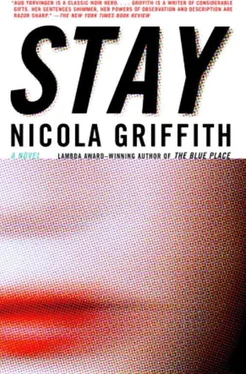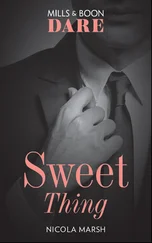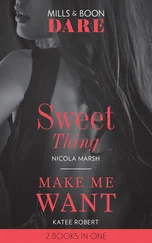I got in the truck, turned it on. I could just drive away and never come back. I checked my throat in the mirror: red, but not reopened.
It took four minutes of slow and careful backing and filling before I had the rig on the side of the road, pointing south. Each time I twisted, each time I moved my right arm to change gear, I thought I might throw up. Just a message. The hitch didn’t feel right, but there wasn’t time to check it properly. Somewhere a sharp-eared neighbor might be dialing the sheriff. I turned off the engine, climbed down, went back to the car. The child was so quiet I could hear the two in the back breathing slowly but steadily. The child—Luz, her name is Luz—had unfastened her seat belt.
“Fasten it back up.”
Luz looked at me. “Button?”
“We have a short drive to make first.”
She looked over her shoulder at the woman Goulay and Mike, but didn’t speak. Probably thought I’d shoot her if she did.
I had to slow for every curve. With that tire gone, the car tilted to one side and the front wheels had a tendency to skate. I checked the rearview mirror often. No pursuing traffic. “How far can you walk?”
Now the look I got was full of incomprehension, as though I were speaking Urdu. How many nine-year-olds would know how far they could walk? She could probably manage three or four miles without any lasting damage, and I could always carry her. “There’s a map in the glove compartment,” I said. “Pass it to me please.” I slowed, one hand on the wheel, the other tracing tiny lines. Brink Creek campground was about four miles. The woods there would be dense enough to confuse most city people, and there wouldn’t be much traffic. I handed the map back to Luz, who refolded it and put it back in the glove compartment without being asked. Remarkable adaptation to circumstances. Her early life must have been interesting. Or perhaps all nine-year-olds were this resilient.
The campground was empty. I pulled in under the trees, parked, and pocketed the keys. Luz seemed to listen to the silence.
“Now you have to help me wipe the car down.” I eased Goulay’s heavy coat off her shoulders and ripped away one of her cardigan sleeves. “Take this and rub it all around the steering wheel. It’s very important that you rub every single bit of the surface.”
“Why?”
It wasn’t her fault the Carpenters didn’t have a television. I forced myself to breathe through the pain in ribs and knee, and managed to speak without growling. “Fingerprints.”
While she scrubbed industriously at the wheel and gear stick I tore off the other sleeve and wiped at the doors and roof where I might have touched the metal inadvertently. Then I tackled the shiny vinyl on the backs of the seats and inside windows.
I remembered the belt and wiped that down, too—after I’d retied it around Mike’s ankles. He must be more supple than I’d thought. Just as I was finishing that, he woke. “Don’t,” I said in his ear. “Keep still and you’ll be fine. She’ll wake up in a few hours and untie you.” It would be dark and cold by then. I tucked Goulay’s arms back into her coat.
I motioned Luz away from the car, gave the wheel and stick a quick wipe myself, then threw the ragged sleeve on the front seat.
“Now we walk back to the trailer. It’s a long way.” She didn’t move. “What?”
“My stuff.”
The suitcase, in the trunk.
At first she insisted on carrying the case herself. She carried it two-handed, in front of her, bumping her knees. I tried not to wince.
“When you get tired, let me know.”
I matched my pace to hers, but even at two miles an hour my knee burned. The back of my neck throbbed and every now and then my hands tingled. Some kind of nerve bruise. I felt at my ribs gently as I walked; no obvious splintering. Cracked, perhaps, or maybe just soft-tissue injury at the sternum. Cartilage probably.
I had no idea what to do with this child. I had seen the look on her face as Goulay tried to take her away from the Carpenters. But a dog will bond even with a cruel owner, one who beats it and starves it.
We walked on. Luz began to lag. I slowed even more. She hung on to the case with grim determination. I had no idea what nine-year-olds talked about.
“What’s in there, then? Gold and jewels?”
“Stuff.”
“We can buy you more stuff. More clothes.”
“Not just clothes.”
Of course. Books. “You know what one of my favorite books used to be? The Lion, the Witch and the Wardrobe . Have you read that?”
On an adult, her expression would have meant, Don’t tell me you love me if you don’t mean it. I plowed on, glad I didn’t have to lie. “I’ve read all of them.”
“There are seven!”
“Yes. I’ve read them all. But I think The Lion, the Witch and the Wardrobe is my favorite. Or maybe Prince Caspian .” A bloody thirty-two-year-old Norwegian discussing 1950s English novels with a nine-year-old Mexican girl in backwoods Arkansas.
The absurdity of the situation didn’t seem to bother her. “I like it best when they have supper with Mr. and Mrs. Beaver,” she said. Safety, warmth, food. Tenderness. Every child should have them. “And I like it when Edmund is in the sleigh in the snow with the White Witch eating Turkish delight.” She swang the suitcase to one hand, then changed her mind and tried the other.
“You want me to carry that for a bit?”
“Okay. Just for a bit.”
All her worldly possessions. It weighed about eight pounds. Not much, but eight pounds more than I wanted to carry.
“I like it too that Edmund was good in the end and that his sisters and brother were nice to him.” She frowned. “But I don’t know what Turkish delight is. Aba doesn’t know, either. She said maybe it’s kind of like chocolate.”
“Real Turkish delight is soft and squashy and sweet. It comes in round boxes. The pieces are pale yellow or pink cubes, and all dusted with powdered sugar.”
“Is it nice?”
Being in the rig, being out of sight, and getting my ribs taped would be nice. “It’s a bit perfumey, like eating roses. Sickly. I’ll buy you some if you like, then you can tell me.”
“Aba doesn’t like me to eat sweet things.” A slitted, sideways glance.
Aud Torvingen, White Witch. “Did you know that they made a film based on The Lion, the Witch and the Wardrobe?”
She gave me that look that said I was speaking Urdu again, and I remembered she didn’t go to school, where children are exposed to other children talking about cartoons and movies and gross-out videos.
“So what books do you have in here?” She shook her head and flushed, which I hadn’t seen her do before. “Must be a heavy one.”
She actually hung her head. I imagined her poring over a book of knowledge in tiny type with black-and-white illustrations that was forty years out of date and smelled of mildew, imagined her agony of indecision when it came time to pack her things: she would have wanted it so, but known it was stealing.
“I could buy you encyclopedias, too. New ones.”
“Why?”
“Because they’re better.” But that wasn’t what she meant. She stumbled, but pulled away when I tried to help her.
“How far is it?”
“Another two miles.”
She nodded wearily.
“I could carry you, if you like.” Even if she didn’t like. We were already conspicuous; I wanted to be back at the trailer before dark.
“Like a baby!” Enough energy for scorn.
“Aslan carried Lucy.”
“You’re not a lion.”
“No, but I can talk, not like a horse or a car.”
She considered that. “Okay. But piggyback.”
“Of course.” I shifted the Glock to the front of my waistband and squatted. My knee was visibly swollen. She climbed onto my back. “Wrap your legs tightly because I need one hand for—No!” I pulled her legs down a little. “No,” I said again, more softly, “not there.”
Читать дальше












